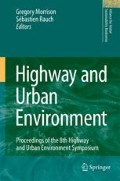Ethanol has been used in Brazil as a passenger vehicle fuel since 1979. Until the year 2000, vehicles were made to run exclusively with either gasoline or ethanol. The MultiFuel engine control module (ECM) was developed allowing vehicles to use fuels with any ethanol percentage, relying only on the existing oxygen sensor as opposed to an add-on ethanol sensor for the percent ethanol evaluation. The use of tank fuel level information allowed for far more robust ethanol percent detection and improved drivability. Four years later, compressed natural gas (CNG) capability was integrated into the MultiFuel technology. Prior to that, vehicles using CNG normally required a second ECM. The MultiFuel integrated with CNG capability is known as the Tri-Fuel system. It uses only one ECM, seamlessly controlling both liquid (ethanol blends and gasoline) and CNG fuels with little power loss, and excellent drivability and fuel consumption. This paper will present both the MultiFuel and Tri-Fuel technologies.
Access this chapter
Tax calculation will be finalised at checkout
Purchases are for personal use only
Preview
Unable to display preview. Download preview PDF.
References
Brazilian Automotive Industry Yearbook, 2004
Richard S (1999) Introduction to internal combustion engines, 3rd edn. SAE and Macmillan, Washington, DC
Theunissen FMM (2003) Percent ethanol estimation on sensorless multi fuel systems: advantages and limitations. SAE Technical Paper no. 2003-01-3562
Bosch R (1996) Automotive handbook, 4th edn. Wiley, New York
FuelTable, US Department of Energy. Also at www.eere.energy.gov
Combustíveis para Motores Endotérmicos, Enfoque no Gás Natural Veicular. Diocles Dalavia. Petrobrás
Renewable energy in developing countries (2003) Renewable energy world, July-August
Brazil taking the lead in biofuels (2005) Petrol World August
Gás Natural na Matriz de Combustíveis Veiculares (2005) Luciana Bastos de Freitas Rachid, Petrobras
Well-to-Tank Energy Use and Greenhouse Gas Emissions of Transportation Fuels (2001) North American analysis, vol. 2, Argonne, IL
Dias de Oloveira ME, Vaughan BE, Rykiel J Jr (2005) Ethanol as fuel: energy, carbon dioxide balances, and ecological footprint. BioScience 55:593-602
Author information
Authors and Affiliations
Editor information
Editors and Affiliations
Rights and permissions
Copyright information
© 2007 Springer
About this paper
Cite this paper
Volpato, O., Theunissen, F., Mazara, R., Verhaeven, E. (2007). Engine management for Flex Fuel plus compressed natural gas vehicles. In: Morrison, G.M., Rauch, S. (eds) Highway and Urban Environment. Alliance For Global Sustainability Bookseries, vol 12. Springer, Dordrecht. https://doi.org/10.1007/978-1-4020-6010-6_3
Download citation
DOI: https://doi.org/10.1007/978-1-4020-6010-6_3
Publisher Name: Springer, Dordrecht
Print ISBN: 978-1-4020-6009-0
Online ISBN: 978-1-4020-6010-6
eBook Packages: Earth and Environmental ScienceEarth and Environmental Science (R0)

